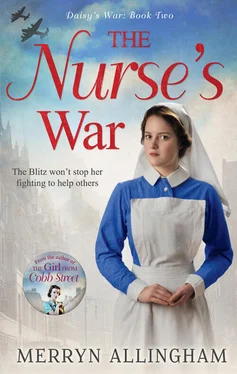She threw her respirator into the corner of the room and fell on the bed, still fully dressed. She was tempted to sleep in her uniform, except she couldn’t see how she was ever to sleep that night. Supper had been missed but she hardly cared. A plate of stodgy carbohydrate was the last thing on her mind. She lay looking up at the ceiling, her eyes painfully sore, tracing every crack in the plaster, every smudge in the whitewash, round and round, up and down. Waves of shock, of disbelief, broke over her. Guilt, too, swelled and foamed in their midst. There had always been guilt. Gerald had wronged her but he had also given his life to save her.
Except that he hadn’t. He had lived, and now he was on her doorstep asking for help. She was his wife, he’d said, and she had to aid him. That angered her. She had been no wife in any sense of the word. He’d made sure of that. He hadn’t wanted to marry, had accused her of forcing his hand, and she’d been made aware of his resentment almost every one of the days she had spent with him in India. The bungalow they’d shared had become a prison. Now it suited him to remember there had been a marriage and that she owed him loyalty. But even if she agreed and was willing to help, how on earth could she? He hadn’t listened but she’d told the truth when she’d said that she had no money and no contacts. Nobody who could miraculously produce the papers that would enable him to travel to another country.
She fixed her eyes on the ceiling, following again the cracks as they traced a snaking path from one side of the room to the other. Her mind was roaming to a dangerous place, to the one man who might know how to pull strings. But she would not think of Grayson. She had trained herself not to. She wasn’t sure he could help or that he’d be willing to, and she certainly wasn’t going to ask. Gerald was a deserter and Grayson would take a very dim view of that. In any case, her friendship with him was over, decidedly over. Six months ago he’d taken his dismissal, she’d thought, almost gratefully, and moved on to a new love. No doubt he was already halfway to being married himself.
She uncurled the piece of paper Gerald had pushed into her hand. The address he’d written was a street she knew well, one deep in the East End and near her own birthplace. Near Gerald’s birthplace, too, though he had never admitted it. Until tonight when he’d spoken of his parents. But that was a slip of the tongue, she was sure, brought on by the stress of the moment, and it wouldn’t be repeated. She clambered wearily off the bed and removed her uniform, piece by piece. However distressed she felt, she had to get some sleep. The alarm was set for six o’ clock and tomorrow would be another exhausting day. It was her turn again to accompany a group of patients to St Albans. From early in the morning, the converted ambulances would be waiting in convoy outside, ready to convey to safety those casualties well enough to travel. St Barts had received several direct hits and, though no one had yet been killed, the blasts had been severe enough to blow several nurses across their ward. In comparison Hill House seemed a sanctuary.
She had been asleep barely an hour when a hammering on the door woke her. The Home Sister, Mrs Phillips, was making her way along the corridor, shouting at the nurses to come down immediately. Through the blur of sleep, she heard the unmistakable sound of the siren and in the near distance the drone of planes and the roar of guns massing in unison. Another night raid, another night spent on mattresses in the basement. She wondered why they’d ever complained about the phoney war. Until last May they’d been waiting for the bombs that never came. If only that had continued. Initially, there’d been a flurry of planning. A million burial forms had been issued, the zoo had killed its venomous snakes and London had been emptied of its children. And then the wait for something to happen. At the time it had seemed endless, but when it was finally over, she was left bewildered that they’d wished for anything else. Fifty-seven nights of continuous bombing had reduced London to a state of siege. Then out of the blue, the bombs had ceased. People had begun to relax. They’d lost their tired and haunted look, lost their red-rimmed eyes which told of fear and sleepless nights. But it hadn’t lasted and a few weeks ago, the bombardment had started anew and nerves were once more becoming stretched.
She staggered to her feet, wondering how big the raid was likely to be and whether or not she might make it back to bed that night. She had reached the door when a loud thump the other side made her jump back.
‘You clumsy idiot!’
It was the voice of Lydia Penrose and Daisy had a very good idea of the victim. She opened the door a fraction and saw Lydia picking herself up from the floor, her face an ugly red. A briefcase had disgorged its contents and books and papers lay scattered on the landing.
‘I didn’t push you,’ Willa Jenkins was assuring her colleague. ‘I think you must have caught your foot in the carpet. It’s worn into a hole back there. Look.’ And she pointed behind her to the staircase both girls had just run down.
‘So you’re saying it’s me that’s clumsy!’ Lydia barred the way aggressively, standing with hands on jutting hips. ‘That’s pretty good coming from someone who breaks everything in sight. You can’t have earned a penny since you’ve been here with all the stuff you’ve had to pay for.’
Willa stood her ground. ‘I may have broken a syringe or two, but I didn’t push you.’
‘A syringe or two!’ Lydia snorted. ‘The factory can’t keep up with you, Jenkins, and I distinctly felt your fat little hands in the small of my back.’
For once Willa was proving obstinate. She shook her head, refusing to take the blame.
‘I’m not arguing with rubbish like you,’ Lydia flung at her. ‘You can pick up everything you made me drop.’
When the girl made no move to comply, her tormentor came right up to her and shouted in her face, ‘NOW!’
Even then Willa didn’t immediately do as she’d been ordered and Daisy could see her trying to summon the courage to resist. She knew that feeling. How many times in the orphanage had she tried to fight back and failed? And it was the same for Willa. The girl’s shoulders sagged and she knelt down on the landing and obediently began to heave books and papers into the briefcase.
‘Do it neatly,’ Lydia almost screeched. ‘In the right order. In the order I had them.’
‘I don’t know what that was,’ the girl said miserably.
She was still picking up books when Sister Phillips’ head appeared over the bannister. ‘Get a move on nurses, the raid is almost on us. And that means you, too, Driscoll,’ she scolded, catching sight of Daisy in the doorway.
‘I’m coming, Sister.’ Mrs Phillips was not a woman you disobeyed lightly. She did her job dourly and any nurse who stepped out of line knew she would face a sarcasm that could wither.
But tonight Daisy was willing to risk it. When the senior nurse had disappeared down the stairs followed by her two acolytes, she crept back into her room and shut the door behind her. Tonight she could not bear to be in the company of her fellows, to share the basement’s windowless prison, to lie and listen to the sniffs, the coughs, the fidgeting limbs of a score of bodies, while she longed for forgetfulness. She would stay above ground and hope to sleep once the bombers had passed.
But not yet. The sound of approaching aircraft grew louder. A mad cacophony of guns and bombs burst through the night and assailed the dark, empty streets. With care she lifted the corner of the blackout curtain and squinted through the small square she’d uncovered. She saw immediately that it was another big raid. The sky was laced with light: the beams of searchlight batteries, the stars from bursting shells. A rainbow of colours—green, red, yellow, white—tumbled one over another in endless profusion. Coloured tracers like giant strings of beads winged their way through the sky in search of planes which had no right to be there. Planes that brought death and destruction. Whichever way she looked, from east to west, the night was aglow. Flashes from hundreds of incendiary bombs split the darkness and on the horizon dozens of fires burned, as though they were giant open air furnaces. All around Charterhouse Square, the stone of the buildings was lit with a white glare. Wearily, she let the curtain fall and climbed into bed. She would stay here and take her chances.
Читать дальше












